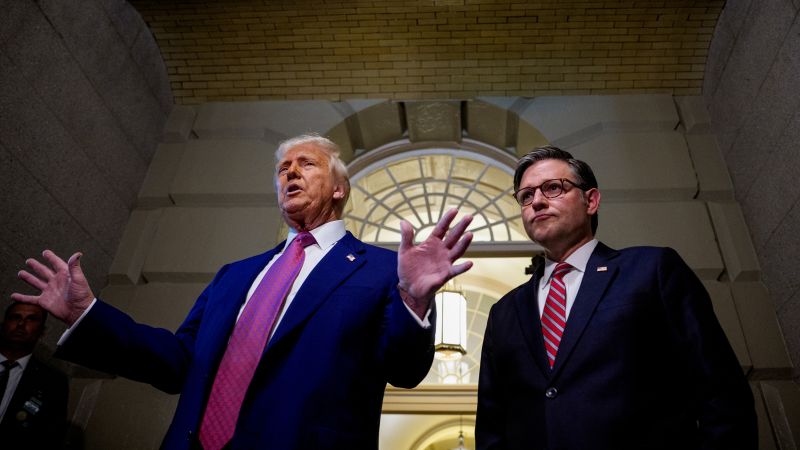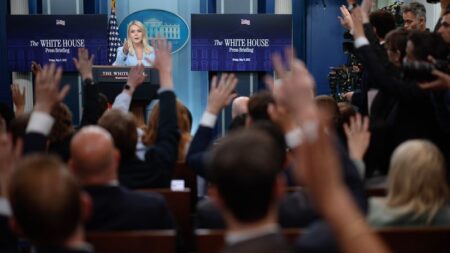The political landscape in Washington is undergoing intense scrutiny as President Donald Trump and House Speaker Mike Johnson prepare for a decisive moment on a legislative front. Scheduled for a crucial vote on Wednesday, GOP leaders are striving to deliver Trump’s initial legislative triumph before the upcoming Fourth of July holiday. The stakes are monumental, as the outcome will reflect the ability of both Trump and Johnson to unite their party members and press forward with significant reforms.
As legislators navigate through the complexities of governance, the latest Senate-approved bill stands as both an opportunity and an obstacle. The challenge on the horizon is to pass this legislation through the deeply divided House without amendments, aligning with their self-imposed deadline. This pivotal task is emblematic of the party’s struggles to maintain legislative cohesion amidst competing interests and ideological splits.
The Senate’s recent endorsement of the bill, achieved after a hotly contested period, marks a considerable win for President Trump. His efforts to consolidate support from fellow Republicans have culminated in a multi-trillion-dollar legislative package—comprising tax cuts, increased funding for the Pentagon, and enhanced border security measures. However, it also contains provisions for significant spending cuts, potentially the most substantial downsizing of the federal safety net in decades.
Within the House of Representatives, GOP leadership expresses optimism about the bill’s passage, bolstered by a belief that it aligns with the party’s vision. Nevertheless, multiple sources indicate that the path to consensus will require considerable political leverage. Many members have voiced their discontent regarding substantial changes made by the Senate just prior to the bill’s passage.
Speaker Mike Johnson faces additional pressure, given the slim margin of error he has in this vote—just three dissenting votes could jeopardize the entire initiative. The internal conflict between centrist Republicans and hardline conservatives adds another layer of complexity for Johnson as he navigates the intricate landscape of House politics. The unfolding situation may define Trump’s second term; however, ongoing GOP infighting has raised concerns among party members regarding possible repercussions for the 2026 midterm elections.
Should the legislation successfully navigate through the House, Trump and his associates view it as a critical move to cement his legacy, particularly regarding border security and tax reform. Promise fulfillment on no taxes for tips or overtime pay and efforts to curtail federal expenditure by instituting work requirements for able-bodied Medicaid and SNAP recipients could be central highlights of this legislative victory.
Amid this legislative brawl, dramatic events have marked the Capitol, including Republican Sen. Thom Tillis’s unexpected announcement to abandon his reelection bid following backlash over his vote against Trump’s bill. Such moments reveal the high stakes involved and the growing pressures on lawmakers as they respond to both their constituents and party leadership.
The House is set to return on Wednesday to continue grappling with the bill’s implications, with Johnson facing growing consternation among his party ranks regarding the final details. Before advancing to a decisive vote, the House needs to pass a procedural measure referred to as a “vote on the rule,” which has drawn threats of rebellion from some conservative members, intensifying Johnson’s challenges.
In a critical showing of party dynamics, the House Rules Committee voted early Wednesday morning to progress with Trump’s agenda after nearly 12 hours of deliberation. Yet, opposition from conservatives such as Reps. Ralph Norman and Chip Roy, who reject the Senate’s modifications, added further complications to the path forward.
Amid these discussions, Johnson has liaised with Dr. Mehmet Oz, one of Trump’s medical advisors, along with more centrist Republicans from the Republican Main Street Caucus, addressing reservations about the packaging of health-related provisions included in the Senate’s draft.
With intense feelings of frustration pervading among party members, moderate Republicans find themselves grappling with not only specific provisions but also the broader implications of the entire package. The negotiations in the House and participation from various interest groups reflect extensive challenges, as they balance retaining party unity and addressing diverse concerns from across the political spectrum.
As anticipation builds for the morning vote, both Republican and Democratic leaders are working tirelessly to ensure their members are present, given the razor-thin margins. Unexpected weather conditions across the East Coast have played a significant role in thwarting travel plans for several lawmakers, creating a logistical nightmare for attendance and potentially impacting the bill’s passage. Johnson acknowledged the situation’s seriousness, underscoring the need for a strategic response to ensure all hands are on deck when votes are called.
The culmination of these events illustrate the persistent tensions and strategic maneuvers defining modern American politics as both parties grapple with a highly polarized atmosphere. As the vote approaches, the outcome remains uncertain, palpably influencing future legislative efforts and party cohesion within the divided chambers of Congress.











